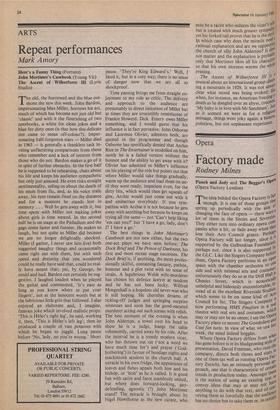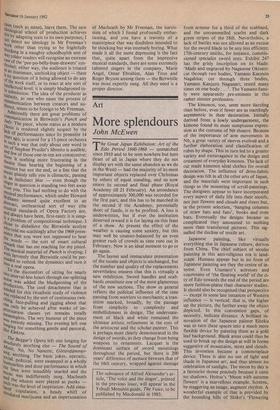Opera
Factory made
Rodney Milnes
Punch and Judy and The Beggar's 010 (Opera Factory London) The idea behind the Opera Factory is flt enough. It is one of those groups t"h ..f spring up periodically with the aim ° changing the face of opera — there were a lot of them in the Sixties and Seventies' They either turn into ordinary opera corn' panies after a bit, or fade away when theY lose their Arts Council grants. Perhaps Opera Factory will last longer, since it rs supported by the Gulbenkian Foundation; perhaps not, since it is also supported b3le the GLC. Like the Singers Company bef°1:,0 them, Opera Factory performs in an 01;ll'e space with the chamber orchestra to On side and with minimal sets and costumes' unfortunately they do so at the Drill Hall ,I,11 Chenies Street, which is acousticanY unhelpful and hideously uncomfortable, ill. stead of at the excellent Riverside Studios' which seems to be on some kind of Arts es Council hit list. The Singers Company al now performing HMS Pinafore in a rel theatre with real sets and costumes, which may or may not be an omen; I see the °Pell Factory plans to mount The Gondoliers and Cosi fan tulle. In view of what we saw 1°5 week, the mind indeed boggles. Where Opera Factory differs from wh,,aft has gone before is in its bludgeoning style live presentation. David Freeman, who runs t company, directs both shows and stars to one of them (as well as running Opera Fac tory Zurich), has an intensely personal To proach, one that is characteristic of certa_ trends in production today. Amongst the t7) is the notion of using an existing tohave convey ideas that may or may not s, anything to do with that text, and of &cc veying them so forcefully that the audierl.ii has no choice but to take them or, in CC° cases (such as mine), leave them. The new ideological school of production achieves this by adapting texts to its own purposes; I can detect no ideology in Mr Freeman's work other than trying to be frightfully shockingin a naughty schoolboyish sort of „, "a3' (older readers will recognise an extreme ease of the 'pee-po-belly-bum-drawers' syn- !nine); either way, the audience is treated is, an inanimate, unthinking object — there pip question of it being allowed to do any 91 the work itself, or to react at any sort of intellectual level: it is simply bludgeoned in- t° submission. The idea of the producer as ,nlindwife, as one who eases the process of r7.411ninnication between creators and au- lenee, seems to be foreign to Mr Freeman. Admittedly there are great problems of Clunimunication in Birtwistle's Punch and Y. The piece, whose status as a modern lack �asstc is rendered slightly suspect by the of performances since its premiere 14 Years ago, is scored for a 15-piece orchestra t: such a way that only about one word in of Stephen Pruslin's libretto is audible, ittici few of those one-in-ten are consecutive; Lere is nothing more frustrating in the theatre than hearing the beginning of a ,sentence but not the end, or a line that the rusie plainly tells you is climactic, passing singer an indistinct blur — even though the from in question is standing two feet away musical You. This had nothing to do with the "Chs,.leal performance, which under Howard ",ullams seemed quite excellent in an abstract, untheatrical sort of way (the musical standards of Opera Factory are, d always havebeen, first-rate): it is sim- /a problem of compositional technique. I chose to disbelieve the Birtwistle acolyte who told me scathingly after the 1969 lie prem- T4e that you were not supposed to hear words — the sort of smart cultural remark that has me reaching for my pistol. The Musical material of Punch is riveting; 1 wish fervently that Birtwistle could be per- ishaded to rethink the dynamics and turn it nt,?, a real opera. t to the discomfort of sitting for nearly itwo interval-less hours through ear-splitting production. was added the bludgeoning of the r.roduction. The cool detachment that is "weeded for this ritualistic study of violence replaced by the sort of continuous twit- ching, face-pulling and jigging about that 137.:, Ply be achieved after weeks of im nuvisation classes yet remains totally ;eaningless. The wry humour of the piece :s entirely missing. The evening left one iitriging for something gentle and pastoral, 4e Elektra.
abrhie Beggar's Opera left one longing for A / L° t e Y anything Nane ee — The Sound of ``ale, o, No ls GOtterdtimnier- sne' ,anything. The basic jokes, operatic, h„ al, Political, were swamped in a wholly ti;illiourless and dour performance in which music lines were inaudibly snarled and the a„",ste was indifferently sung. Macheath st7 the whores were played as punks latch was the level of inspiration. Add simu- st ed copulation, a heady whiff of Ululated marijuana and an impersonation
of Macheath by Mr Freeman, the narcis- sism of which I found profoundly embar- rassing, and you have a travesty of a masterpiece that was doubtless intended to be shocking but was intensely boring. What made it all the more depressing is the fact that, quite apart from the impressive musical standards, there are some extremely talented singers in the company, Marie Angel, Omar Ebrahim, Alan Titus and Roger Bryson among them — the Birtwistle was most expertly sung. All they need is a proper director.



































 Previous page
Previous page